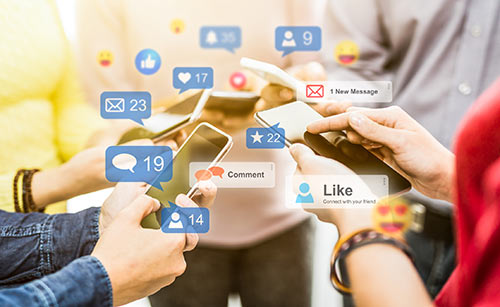By Anna McKenzie
Without question, social media has increased our exposure to both the positive and negative aspects of social life. At their worst, these platforms have arguably created the potential for addiction as well as harm to our mental health. Likes, comments, and shares — seemingly indicating approval or popularity — promote continuous feelings of reward. Negative interactions or a lack of interaction can increase feelings of inferiority, which may spur bouts of anxiety or toxic thinking. Because of these issues, we face a digital dilemma: If we remain on these platforms, we run the risk of feeling demoralized or isolated; if we leave these platforms, we run the risk of feeling demoralized or isolated.
The Netflix documentary The Social Dilemma (2020) highlights the damaging and wide-ranging effects that social media can have. Some have argued that the blame can’t rest fully on these digital platforms, but that users must change the way they interact with the platforms and better understand what’s at stake. Critics have also said that Netflix seems to be playing Facebook at its own game with the documentary, utilizing emotion and the power of suggestion to influence viewers’ behavior or thinking on the subject.
In lieu of these discussions, our questions remain: Is social media truly harmful? Are there healthy ways to use social media? Can social platforms actually improve our mental and emotional well-being, depending on how we use them?
How Social Media Affects Mental Health
Nearly half of teens say they’re overwhelmed by the drama they encounter on social media platforms, and approximately 26% say that these platforms make them feel worse about their own lives.
Through the ages, social pressure and relational interactions have always had an impact on our mental health. In the digital era, social media has simply made the opinions of others more available to us. Because of all the ways we use the internet, our lives have become nearly inseparable from the digital platforms where we can — and are sometimes required — to interact with others. We are always “on,” at times unable or unwilling to unplug, fearing that we will miss something important if we step away.
But our refusal to step away may be more detrimental than staying “connected.” Studies show that social media can be overwhelming and increase feelings of loneliness. According to the Pew Research Center, nearly half of teens say they’re overwhelmed by the drama they encounter on social media platforms, and approximately 26% say that these platforms make them feel worse about their own lives. According to the American Psychiatric Association, 67% of adults say that social media use is related to feelings of loneliness and social isolation.
The Relationship Between Social Media and Addiction
To uncover more of how social media affects us, the relationship between social media and addiction has also been explored. Social platforms are purposefully designed to keep users engaged, which involves rewarding certain actions. Not only that, but research shows that self-disclosure is associated with increased activity in the brain’s reward center. Social media allows people to talk about themselves to many other people on an ongoing basis. One study says that “upwards of 80% of posts to social media sites (such as Twitter) consist simply of announcements of one’s own immediate experiences.”
A study from the Journal of Behavioral Addictions reveals there’s a correlation between excessive social networking site use and deficient value-based decision making. In other words, frequent social media users were found to engage in more risk-taking behaviors. In this study, the connection between substance use disorder and excessive social media use could be clearly drawn. The results could mean that those with substance use or other behavioral disorders are more prone to social media addiction; they could also mean that excessive social media use may contribute to other reward-seeking and risk-taking behaviors.
So, who is most at risk of becoming addicted to social media? Research from Addictive Behaviors shows that people more vulnerable to social media addiction tend to be younger, single, have lower income, have lower education, and have lower self-esteem. It also showed that females were more vulnerable than males, perhaps due to issues of self-image, given that social media is highly image-focused. This research also revealed that addictive social media use was related to higher degrees of narcissism.
How Can Social Platforms Be Used to Help, Not Harm?
When used properly, social media has an upside. The COVID-19 pandemic limited everyone’s ability to get together in person, which meant that a good deal of communication moved to digital platforms. Social media offered the ability to remain connected and not feel cut off from the world during this period. Social media also tends to be a place for exposure to new ideas, movements, products, and entertainment. It’s a hub for human activity, like any popular gathering place — even if we haven’t quite learned how to manage all its different aspects.

In learning to use social media in ways that help us, we must reflect on our intentions. Psychologist Jelean Kecmanovic, writing for Fast Company, says it’s important to know why we’re driven to use these platforms. Are they an escape? Are we avoiding uncomfortable parts of our lives? Are we mindlessly scrolling, or are we actually seeking to engage? “Each time you reach for your phone (or computer) to check social media, answer the hard question: Why am I doing this now?” she says, adding, “Decide whether that’s what you want your life to be about.”
Help When Digital Turns Dark
At The Claudia Black Young Adult Center, we help individuals suffering from addiction, trauma, and mental health issues regain control over their lives. We offer a comprehensive, holistic treatment program that focuses on healing the whole person. That means we address issues related to self-esteem, loneliness, and bullying that can stem from social media. Contact us today if you or someone needs help.

